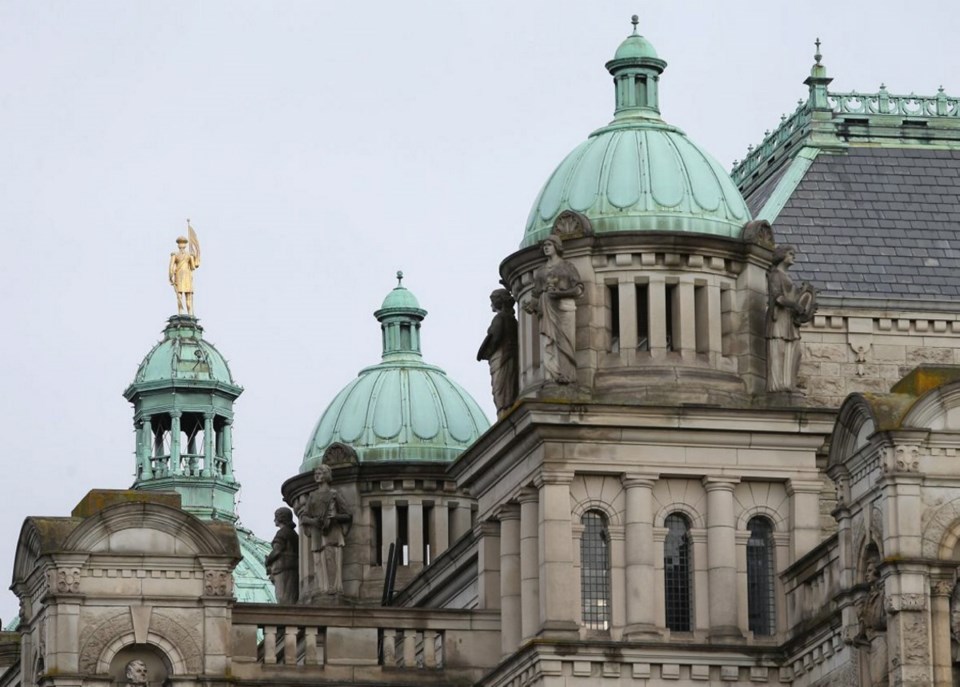 “There are no new tax measures that increase provincial government revenues in Budget 2019,” was the reassuring line in the document.
“There are no new tax measures that increase provincial government revenues in Budget 2019,” was the reassuring line in the document.
Because they’re too busy dealing with the fallout from the last batch, was the unwritten but assumed explanation.
To accept the premise, you have to overlook the carbon-tax increase in April that will bump up all fuel costs and create $200 million more a year in government revenue.
Easy to do, says the government. That was imposed in 2017 and was mandated by the federal government. So it’s not in Tuesday’s budget.
Technically.
But it was featured in the first post-budget debate Wednesday, as opposition B.C. Liberals teed off.
One of the NDP’s points of pride on the spending front was the $900 million earmarked for climate-change initiatives already outlined.
But the expanding carbon tax will bring in about $6 billion over the next three years, with much more to come. So most of it is going into general revenue, since the principle of revenue neutrality was abandoned last year.
There have been enough flip-flops on both sides about the carbon tax that Wednesday’s debate looked like a gymnastics event.
Liberals, who invented it and then let it languish, were attacking its resurrection by the NDP.
They also highlighted a more recent shift in NDP thinking.
Finance Minister Carole James said after her first budget that people “don’t mind paying the carbon tax, if they know it’s going to go to green initiatives and climate action.”
She’ll have to stuff a lot more government spending under the “green initiatives” umbrella to use up $6 billion in new revenue.
Meanwhile, the NDP was proudly defending the escalator clause in a tax that it campaigned against at the outset.
As a former party leader, James led the “axe the tax” chants.
Now, she backs the tax to the hilt.
The rest of the budget is free of new tax increases, which is undeniably a good thing.
But the background provided by the last two NDP budgets, an update soon after they took office and a full budget a year ago, show they didn’t have much choice but to hold off.
Tax increases imposed or signalled then are bringing big swells of new revenue, and accompanying waves of concern from some quarters.
About 1.6 million British Columbians are busy making the solemn “I am not a speculator” pledge to avoid huge property taxes aimed at the 32,000 people who are, most of whom are B.C. citizens.
Taking another run at property owners’ wallets in the midst of that chore would have been asking for trouble. Even people who aren’t facing the increase are annoyed to some degree at the confusion over that showcase tax and the inefficient collection system.
And owners of high-end homes are less than enchanted with the direct surtax on properties over $3 million.
That’s more than matched in the business world, where the employer health tax has kicked in with no escape, no matter how many forms you fill out.
It’s designed to fill the hole left by the eventual elimination of medical premiums on individuals. This year, that hole will be filled with cash to spare.
The budget expects to collect $1.8 billion this year from the tax, growing to $2 billion by 2021, for a total of $5.8 billion over three years.
The kicker is that medical premiums will still be around for another year.
They’ve been cut in half for one transition year before they disappear.
So premiums, a big share of which are paid by employers, will bring in another billion dollars in the upcoming year, on top of the tax revenue.
That’s far more than what the previous government expected to collect from premiums after it cut them in half before the last election.
The year of paying double will take a while to digest, which is why it was a good idea to lay off on tax hikes this year. But most of the spending trend lines suggest it’s just a pause.
B.C. Liberal critic Tracy Redies said the government has “baked in” $13 billion in new spending since it took office.
That’s not counting the cost of $10-a-day child care and the $400-a-year renters’ rebate that have been put off, but are still apparently in the plan.
Revenues are expected to increase all around to keep up. But it’s going to take a sustained run of prosperity and a lot of breaks to maintain the balance without more hikes.



